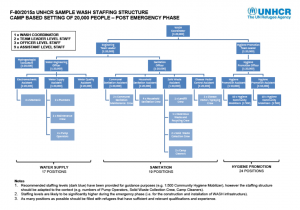
A sample organigram for running a typical refugee WASH programme for 20,000 people in a post emergency camp based setting. The organigram gives an indication of how the WASH Team should be structured in addition to the tentative number of Coordinators, Team Leaders, Officer, and Assistant level staff that should be recruited.
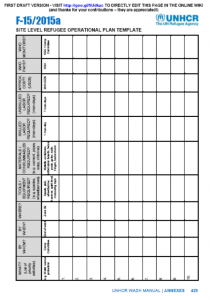
This template can be used to help UNHCR and WASH actors establish a simple WASH operational plan (WHO will do WHAT, WHERE, WHEN, and HOW and WHO will PAY and WHO will MONITOR). This template can be used in addition to the site level WASH Strategy Template.

The Sphere Handbook is one of the most widely known and internationally recognized sets of common principles and universal minimum standards for the delivery of quality humanitarian response.
Tags: Bathing Facilities, Capacity Building, Communal Toilets, Cross Cutting, Disability, Disease Vector Control, Drainage, Environment, Excreta Management, Gender, Gender Based Violence, Grey Water Disposal, Handwashing with Soap, Household Water Treatment, Human Right to Water / Sanitation, Hygiene Promotion, Laundering Facilities, Menstruation Hygiene Management, Piped Water Networks, Protection, Public Health, Solid Waste Management, WASH Assessments, WASH Coordination, WASH Monitoring, WASH Programme Management, Water Quality Testing and Surveillance, Water Safety Plans, and Water Supply. Languages: English. Organisations: SPHERE. Categories: WASH Reference Documents.

These guidelines have been designed to help those involved in the assessment of emergency water sources to collect relevant information in a systematic way, to use this information to select a source or sources and to determine the appropriate level of treatment required to make the water suitable for drinking.
Tags: Boreholes, Bulk Water Treatment, Drilling, Groundwater, Hand Dug Wells, Handpumps, Household Water Treatment, Piped Water Networks, Rainwater Harvesting, Solar Pumping, Spring Protection, WASH Assessments, WASH Monitoring, WASH Programme Management, Water Prospection and Investigation, Water Pumping, Water Quality Testing and Surveillance, Water Safety Plans, Water Storage, Water Supply, and Water Tankering. Languages: English. Organisations: WEDC. Categories: WASH Emergency Guidelines and WASH Reference Documents.
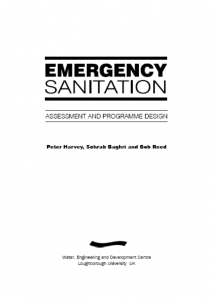
The book Emergency Sanitation: Assessment and programme design has been produced to assist those involved in planning and implementing emergency sanitation programmes. The main focus of the book is a systematic and structured approach to assessment and programme design. It provides a balance between the hardware (technical) and software (socio-cultural, institutional) aspects of sanitation programmes, and links short-term emergency response to long-term sustainability. The book is relevant to a wide range of emergency situations, including both natural and conflict-induced disasters, and open and closed settings. It is suitable for field technicians, engineers and hygiene promoters, as well as staff at agency headquarters.
Tags: Communal Toilets, Desludging and Excreta Transportation, Excreta / Urine ReUse, Excreta Composting, Excreta Management, Excreta Treatment, Household Toilets, Sewerage and Excreta Conveyance, WASH Assessments, WASH Monitoring, and WASH Programme Management. Languages: English. Organisations: WEDC. Categories: WASH Emergency Guidelines and WASH Reference Documents.

Where required, UNHCR and WASH actors should work together to develop a site level refugee WASH strategy document that clearly describes the refugee context, the baseline WASH situation, WASH coverage, WASH gaps, along with short (6 months), medium (6 months – 5 years) and long-term (>5 years) strategies for each of the WASH sub-sectors and the twelve (12) WASH principles. This template can be used to help produce the site level WASH Strategy.
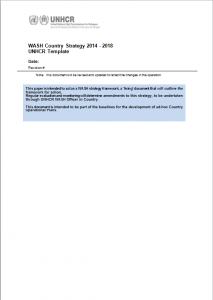
Where required, UNHCR and WASH actors should work together to develop a country level refugee WASH strategy document that clearly describes the refugee context, the baseline WASH situation, WASH coverage, WASH gaps, along with short (6 months), medium (6 months – 5 years) and long-term (>5 years) strategies for each of the WASH sub-sectors and the twelve (12) WASH principles. This template can be used to help produce the Country level WASH Strategy.

This document has been designed to help UNHCR and WASH actors assess WASH infrastructure for potential access from the individual perspective of each type of vulnerable user in particular persons with disabilities, women, children, and the elderly.
Tags: Bathing Facilities, Communal Toilets, Cross Cutting, Disability, Laundering Facilities, WASH Assessments, WASH Monitoring, WASH Programme Management, WASH Strategy Development, and Water Supply. Languages: English. Organisations: UNHCR. Categories: WASH Blank Forms, WASH Operational Guidelines, WASH Policy Guidelines, and WASH Reference Documents.

This document has been designed to help UNHCR and WASH actors assess potential WASH related safety and security issues related to trip, crush, pinch, pierce, cut, splinter, burn, poison, electrocution, road traffic accident, drowning, and gender based violence.
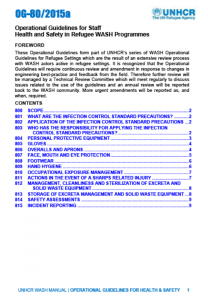
This document provides health and safety guidelines for refugee WASH programmes for staff are involved in either: cleaning of toilets; maintenance of toilets; desludging of toilets; the collection and movement of excreta; the collection or movement of solid wastes; the handling of vector control or water treatment chemicals; any staff who may potentially come into contact with excreta, sewage, wastewater, solid waste, medical waste or any other sources of (potential) infection.
 English
English










